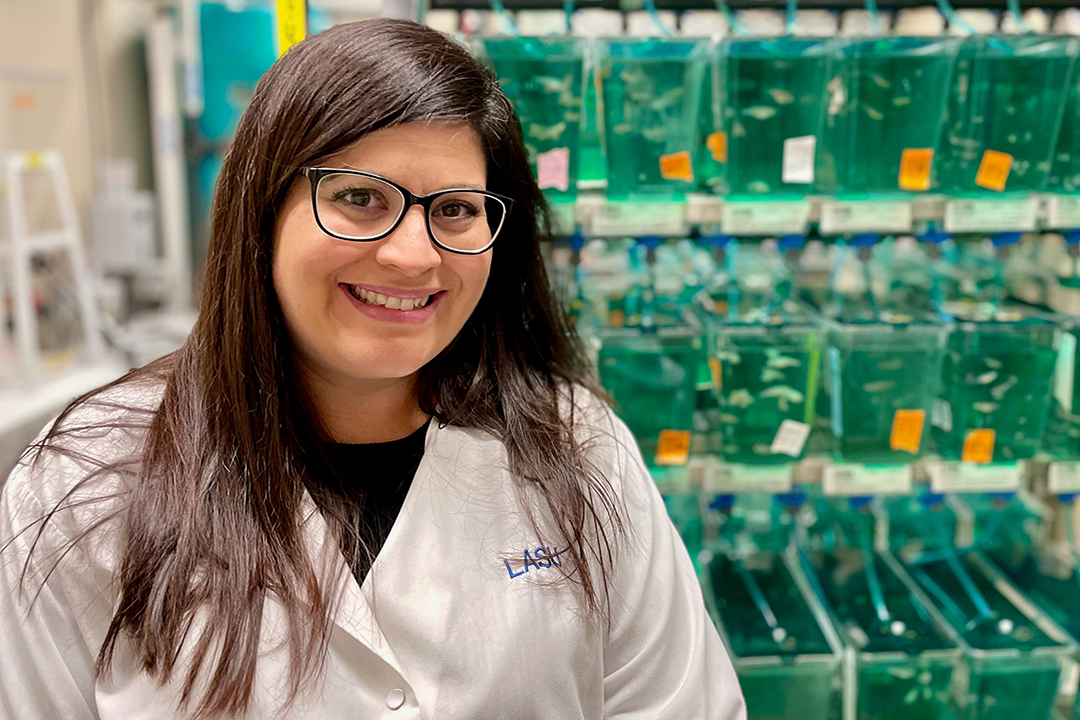Michelle Collins’ earliest Let’s Talk Science memory begins in an elementary school classroom. “The volunteers brought different materials for the activity. We had to build some sort of apparatus that could protect an egg as it was dropped off the roof of the school,” recalls Collins. “We worked in teams, using popsicle sticks, newspaper, and other materials, and we built these contraptions to put our eggs in, and then the Let’s Talk Science volunteer went to the roof of the building and just dropped them off.” As someone who already really liked the sciences, seeing the Let’s Talk Science volunteers and getting to do such a fun experiment was a dream experience. “Our egg absolutely broke,” says Collins with a laugh. “But it was such an impressionable memory, to see this university student, which when you’re 11 or 12 years old seems like a mature adult, just dropping things off the roof? It was so cool!”
Collins continued to nurture her love of science through her studies, first in high school and then in her undergrad at Western University, where she studied genetics. After graduation, she turned her attention to a doctorate at McGill focused on human genetics, followed by a postdoctoral fellowship in Germany at the Max Planck Institute for Heart and Lung Research. She is now an Assistant Professor at the University of Saskatchewan in the Department of Anatomy, Physiology, and Pharmacology.
While in grad school at McGill University, Collins reconnected with Let’s Talk Science, participating as a volunteer in classroom activities and judging science fairs. She also helped facilitate the Let’s Talk Science Challenge, where teams of grades 7 and 8 students compete in a STEM trivia and design contest. A few years later, when she joined the faculty at the University of Saskatchewan in Saskatoon, Collins quickly found her way back to Let’s Talk Science as a faculty advisor. “My original goal was just to see if there was any Let’s Talk Science activity on campus,” says Collins. “When I found the outreach site and spoke to the coordinators there at the time, they said they were looking for a new faculty member mentor. So, I took the position.”
As a faculty mentor, she gets to work with coordinators and volunteers and engage with much of the programming facilitated by the site. Collins has a particular affinity for the classroom outreach facilitated by Let’s Talk Science Volunteers. “Classroom activity is a way that I think we can engage a lot of students before they make that decision in what they want to do,” she says. “It’s a great way to show kids what STEM is, what STEM activities are, and to show that they can do them.”
Looking towards the future, Collins asserts the importance of STEM education and science literacy. “I think skills like problem-solving and critical thinking are promoted in STEM fields, which are important for kids as they grow up, no matter what sort of avenue they decide to take,” says Collins. She stresses the importance of teaching kids how to engage critically with the world around them. “If students have a bit of training or exposure to STEM fields growing up, perhaps they’re able to engage more with the world and news around them, and also feel some ownership over making changes that we need to do to make sure that our earth is around.”
In her new role, Collins is excited to continue fostering connections and working with Let’s Talk Science volunteers. She finds it incredibly special and rewarding to be reconnecting with the organization that sparked her interest in science when she was just a kid, and she encourages everyone to get involved with STEM outreach, whether that be through their Let’s Talk Science Site or connecting with people at their closest university. “Let’s Talk Science is an important organization to me: it’s shaped who I am as a scientist and as a person,” says Collins. “I want to be able to pay that forward in any way I can.”
